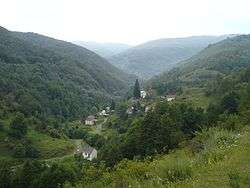Gorno Jelovce
Gorno Jelovce (Macedonian: Горно Јеловце, Albanian: Jalloc i Epërm) is a village in the municipality of Gostivar, North Macedonia.
Gorno Jelovce Горно Јеловце Jalloc i Epërm | |
|---|---|
Village | |
 Gorno Jelovce | |
 Gorno Jelovce Location within North Macedonia | |
| Coordinates: 41°48′N 20°47′E | |
| Country | |
| Region | |
| Municipality | |
| Population (2002) | |
| • Total | 2 |
| Time zone | UTC+1 (CET) |
| • Summer (DST) | UTC+2 (CEST) |
| Car plates | GV |
| Website | . |
Demographics
Traditionally Gorno Jelovce is part of the Upper Polog region although it has also been associated with belonging to Upper Reka, due to linguistic affiliations and cultural connections.[1][2] The population of Gorno Jelovce has consisted over time of Muslim and Orthodox people that are Albanian speakers and in contemporary times are also bilingual in Macedonian.[1][2] The Yugoslav census of 1953 recorded 275 people of whom 253 were Macedonians and 23 were Albanians.[3] The Yugoslav census of 1953 recorded 197 people of whom 185 were Macedonians and 12 were Albanians.[3] The village was without inhabitants during the Yugoslav censuses of 1971 and 1981.[3] The Macedonian census of 1994 recorded 2 people who self declared themselves as Macedonians.[3] According to the 2002 census, the village had a total of 2 inhabitants.[4] Ethnic groups in the village include:[4]
References
- Mirčevska, Mirjana P. (2007). Verbalni i neverbalni etnički simboli vo Gorna Reka [Verbal and non-verbal ethnic symbols in Upper Reka]. Skopje: Institut za Etnologija i Antropologija. p. 283. ISBN 978-9989-668-66-1.CS1 maint: ref=harv (link). "Сите жителина Горно Јеловце денес се билингвисти, освен македонскиот го зборуваат и албанскиот јазик. [All residents of Gorno Jelovce today are bilingual, other than Macedonian speak Albanian.]".
- Osmani, Edibe Selimi (2012). Veshja autoktone e femrave të Rekës së Epërme [Authentic clothing of women from Reka e Epërme]. Skopje: Arbëria design. p. 9. ISBN 9789989578281.CS1 maint: ref=harv (link). "Gjithashtu ka fshatra që nuk shtrihen buzë lumit Radika, si: Dufi me 5 lagjet e shpërndara: Çejani, Ballaboni, Arqevishi, Brezoveci, Tojlani. Ky fshat me lagjet e shpërndara traditën, veshjen, folklorin dhe të folmen e kanë të përbashkët me atë të Rekës së Epërme. Fshati Jellovcë e Epërme, ka tradita, veshje dhe gjuhë e dialekt të përbashkët, edhe pse janë në distancë të largët me Rekën e Epërme. [Also there are villages that do not near the mouth of the river Radika, like: Duf with its 5 scattered neighborhoods: Çejani, Ballaboni, Arqevishi, Brezoveci, Tojlani. This village with scattered neighborhoods tradition, dress, folklore and dialect have in common with that of Upper Reka. Upper Jelovce village, has traditions, costumes, language and dialect in common, although are some distance from Upper Reka.]"
- Sherafedin Kaso (2005). The settlements with Muslim population in Macedonia. Logos-A. p. 134. ISBN 978-9989-58-155-7.. "Gorno Jellovce/Jellovcë e Epërme: Dikur ishte fshati i madh. Banorët, pa dallim të konfesionit fetar, kanë qenë shqipfolës. [Gorno Jellovce/Jellovcë e Epërme: It used to be a large village. The residents regardless of their religious affiliations have been Albanian speakers.]"
- Macedonian Census (2002), Book 5 - Total population according to the Ethnic Affiliation, Mother Tongue and Religion, The State Statistical Office, Skopje, 2002, p. 85.
External links
| Wikimedia Commons has media related to Gorno Jelovce. |